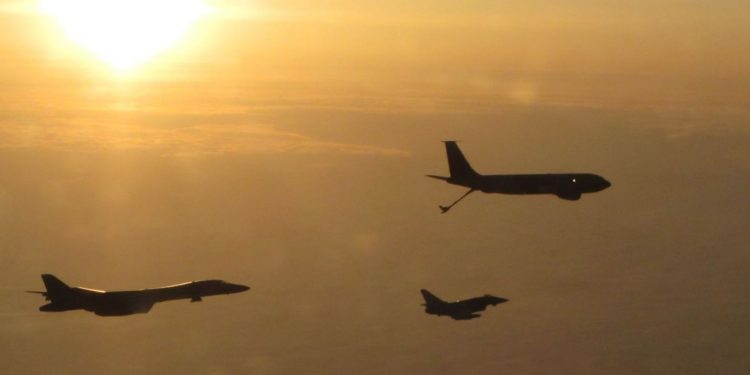Aircraft from the Royal Air Force have been carrying out intensive training sorties with US strategic bomber aircraft over the North Sea.
The Royal Air Force aircraft from RAF stations Lossiemouth, Waddington and Brize Norton were launched, to escort USAF B-1B Lancer bombers, that were conducting their latest long-range training sortie. The US aircraft are part of the US based 28th Bomb Wing, Bomber Task Force and took off from their home base at Ellsworth Air Force Base, South Dakota. The training has also included other NATO and allied nations.
The B-1Bs were met by the RAF Typhoons over the North Sea and were escorted towards the Baltic region where the escort was handed over to Swedish Gripen fighter jets.
A Typhoon pilot from RAF Lossiemouth based IX(B) Sqn said: “It was a privilege to fly alongside our colleagues from the United States Air Force, demonstrating our ability to work with our allies anywhere, at any time. Usually Typhoons from RAF Lossiemouth are launched to intercept aircraft which may pose a threat to UK airspace, identifying them and determining their intentions.”
“In this case we escorted our allies through their first leg of NATO airspace, prior to their mission in the Baltic region” he added.
During the flight across the North Sea the air group was joined by a US KC-135 Stratotanker from the 100th Air Refueling Wing based at RAF Mildenhall, a KDC-10 from the 334th Squadron, based at RNLAF Eindhoven Air Base and a RAF Voyager from RAF Brize Norton to conduct Air to Air Refuelling.
An RAF E-3D Sentry aircraft flying from RAF Waddington was also airborne at the same time. The personnel on board the Sentry coordinated the mission as the RAF and NATO aircraft flew over the North Sea.
For the first time the B-1Bs flew over Sweden to conduct integration training with Swedish Gripen fighters and conducting close-air support training with Swedish Joint Terminal Attack Controller ground teams. On leaving Swedish airspace the B-1Bs were joined by Norwegian F-35As and conducted a low-approach over Ørland Air Station, Norway.
Air Vice Marshal Ian Duguid, Air Officer Commanding 11 Group, said: “This has been another excellent opportunity to demonstrate the continued commitment of the Royal Air Force to the NATO alliance. Working closely with the US and other NATO nations helps build a collective capability within NATO that enhances our level of interoperability.”
He added: “These missions also offer a unique opportunity to test and refine the complex network of Air Command and Control, Intelligence and Space based operations that are essential to delivering front line RAF capabilities.”
“Long-range bomber training missions strengthen our steadfast partnerships with allies across both Europe and Africa and showcase our ability to respond globally from anywhere. This mission further enhances our interoperability capabilities by taking ground breaking steps to incorporate our partners to generate seamless operations,” said Gen. Jeff Harrigian, U.S. Air Forces in Europe and Air Forces Africa Commander.











